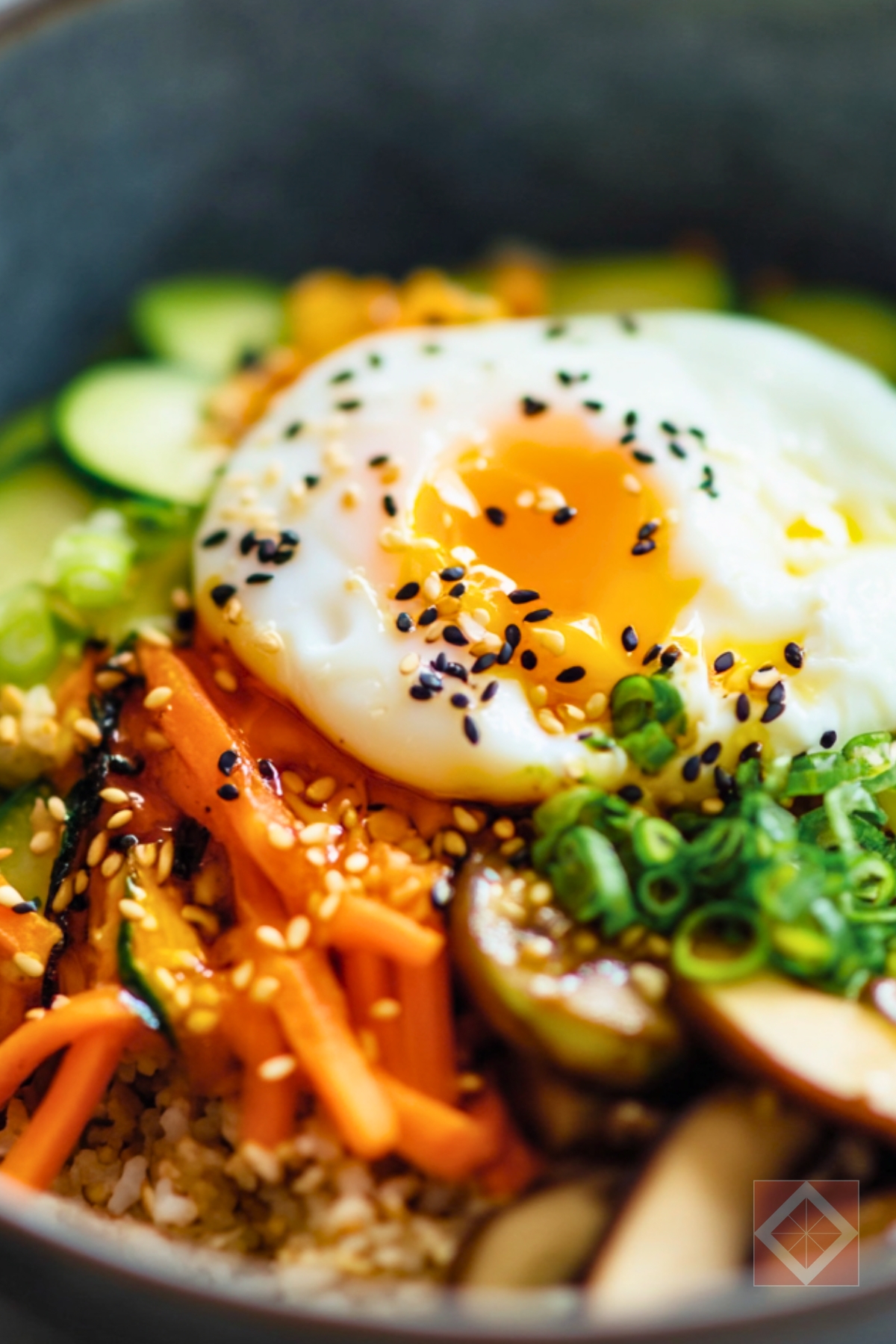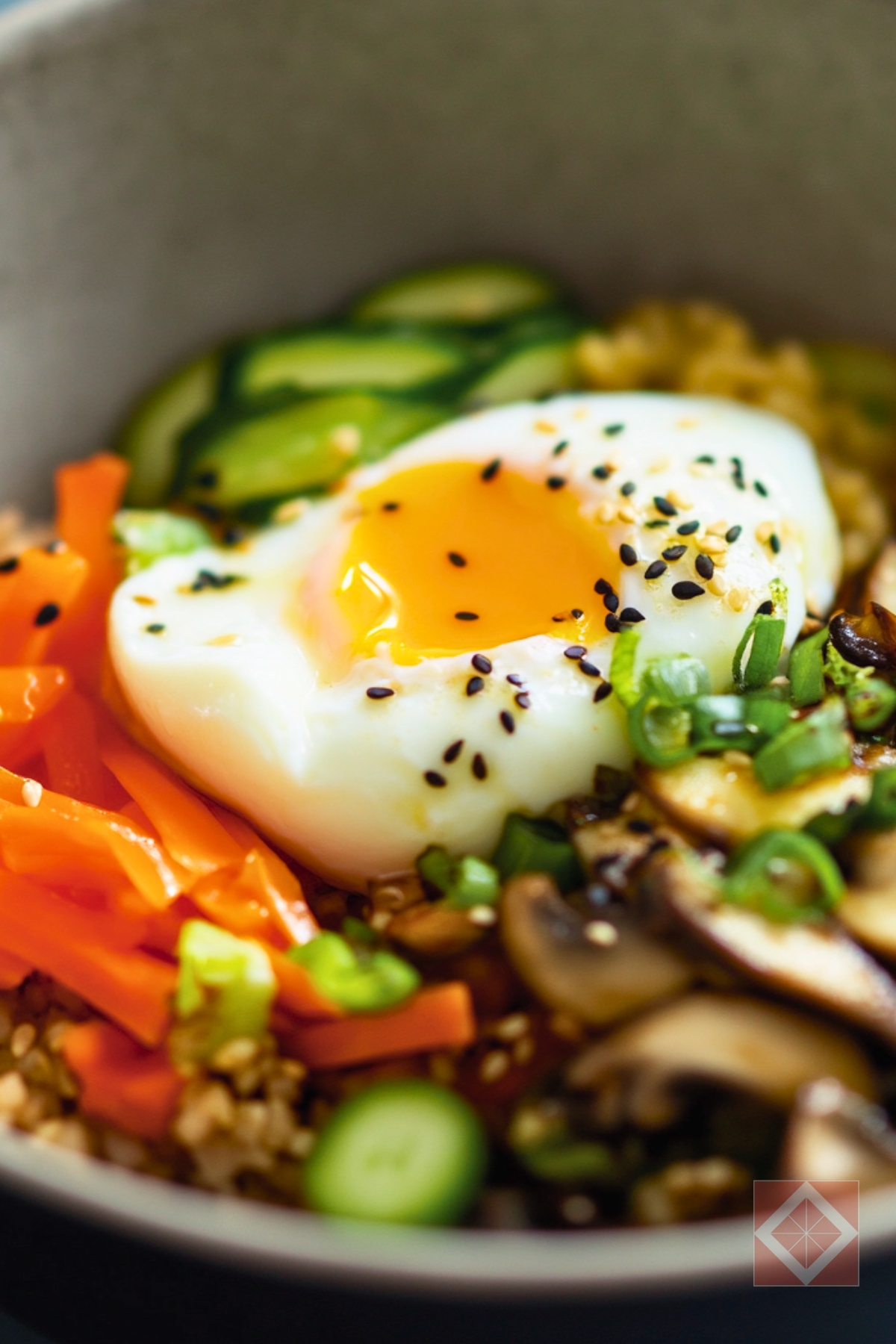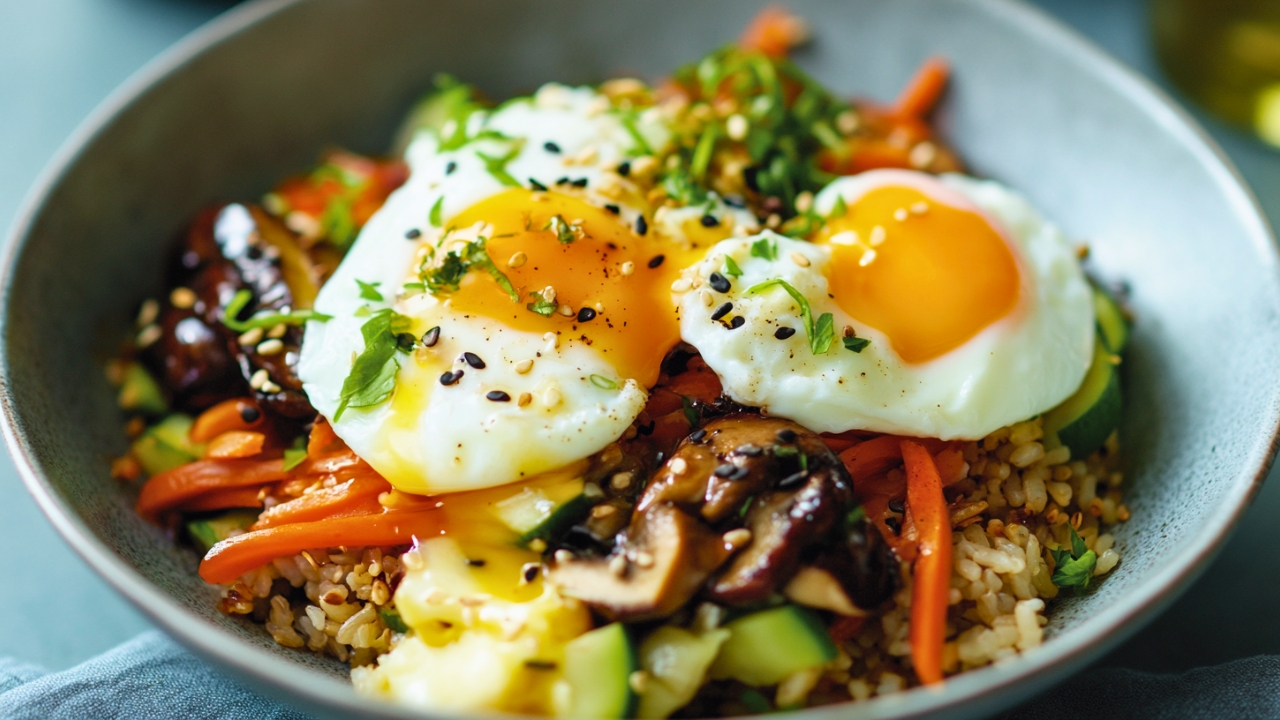If you’re looking for a delicious way to start your day while supporting your body’s natural defenses, this breakfast bibimbap is your answer. Packed with vibrant vegetables, whole grains, and healthy fats, it’s an ideal dish for fighting inflammation and boosting your energy.
Inspired by the classic Korean bibimbap, this dish offers the perfect blend of flavors and textures while prioritizing anti-inflammatory ingredients.
Whether you’re looking to reduce joint pain, improve digestion, or simply eat healthier, this dish is a flavorful addition to your routine.
Why Anti-Inflammation Matters

Chronic inflammation has been linked to numerous health concerns, from fatigue and digestive discomfort to more serious conditions like heart disease and arthritis. Thankfully, a diet rich in anti-inflammatory ingredients can help mitigate these effects.
Vegetables like zucchini, carrots, and mushrooms, along with healthy fats from sesame oil, are all excellent choices for reducing inflammation. Incorporating meals like this breakfast bibimbap into your week can make a noticeable difference in how you feel.
Key Ingredients That Fight Inflammation
This breakfast bibimbap isn’t just delicious—it’s brimming with anti-inflammatory ingredients. Here’s a breakdown of the major players:
- Zucchini and Carrots: Loaded with antioxidants and vitamin C, these vegetables help neutralize harmful free radicals in the body.
- Brown Rice or Quinoa: Both options provide fiber and essential nutrients while helping to stabilize blood sugar levels.
- Mushrooms: Known for their anti-inflammatory compounds, mushrooms also contribute a rich umami flavor to the dish.
- Sesame Oil: A source of heart-healthy fats, sesame oil enhances absorption of fat-soluble vitamins and reduces inflammation.
- Herbs Like Basil and Mint: These fresh herbs are bursting with phytonutrients that support your immune system and fight inflammation.
Each of these ingredients works together to nourish your body and create a flavorful, satisfying meal.
How to Customize for Your Diet
The beauty of this breakfast bibimbap lies in its versatility. You can easily tailor the recipe to suit your dietary needs or preferences without losing its anti-inflammatory benefits.
- Gluten-Free: Swap soy sauce for tamari or coconut aminos to ensure the dish remains gluten-free.
- Vegan: Replace poached eggs with a serving of marinated tofu or tempeh for a plant-based protein boost.
- Low-Carb: Substitute brown rice or quinoa with cauliflower rice to keep the carbs in check while still enjoying the dish’s texture and flavor.
These simple substitutions make it easy to enjoy the recipe while accommodating specific dietary restrictions.
Tips for Getting the Best Results
For a perfectly balanced bibimbap that fights inflammation and satisfies your taste buds, consider these tips:
- Use High-Quality Sesame Oil: A rich, toasted sesame oil brings out the nutty undertones in the dish while offering anti-inflammatory properties.
- Crisp the Rice: Allow the rice or quinoa to cook undisturbed for a few minutes in the pan. This step creates a crispy texture that adds depth to the dish.
- Layer Fresh and Cooked Veggies: Combining raw and cooked vegetables enhances both the texture and the nutrient profile of the meal.
- Adjust the Heat: Add a dash of your favorite hot sauce or Sriracha to bring a spicy kick to the dish, but keep it mild if you’re sensitive to spice.
By following these tips, you’ll create a bowl that’s both visually appealing and packed with health benefits.
Why This Dish Is Perfect for Mornings

Starting your day with an anti-inflammatory meal like this breakfast bibimbap sets the tone for balanced energy and focus. Unlike sugar-laden breakfast options, this dish is nutrient-dense and provides a steady release of energy, thanks to its mix of protein, fiber, and healthy fats.
Plus, the combination of vibrant vegetables and poached eggs is as comforting as it is nourishing.
By making breakfast bibimbap part of your morning routine, you’re not just enjoying a tasty meal—you’re actively supporting your body’s ability to fight inflammation and thrive. Whether you’re cooking for yourself or serving it up for family, it’s a recipe that’s sure to become a favorite.

Anti-Inflammation Breakfast Bibimbap with Poached Eggs
Equipment
- Large nonstick skillet
- Pan for poaching eggs
Ingredients
- 4 tsp toasted sesame oil divided
- 1 carrot peeled and cut into 1/4-inch matchsticks
- 1 zucchini cut into 1/4-inch matchsticks
- 3 green onions white and light green parts only, thinly sliced
- Kosher salt to taste
- 2 cups sliced mushrooms (e.g., shiitake, cremini)
- 1 garlic clove peeled and minced
- 2 cups cooked brown rice or quinoa
- 1 Tbsp chopped basil
- 1 Tbsp chopped mint
- 1 tsp toasted sesame seeds
- 4 poached eggs
- Hot sauce such as Sriracha, for serving (optional)
Variations
- Vegetable Swap: Substitute spinach kale, or mung bean sprouts for any of the listed vegetables.
- Grain-Free Option: Replace the brown rice or quinoa with cauliflower rice.
Instructions
- Heat 1 tsp sesame oil in a large nonstick skillet over medium-high heat. Add carrot, zucchini, and green onions with a pinch of salt. Cook, stirring frequently, until the vegetables are crisp-tender, about 3 minutes. Remove from the pan and set aside.
- Add another 1 tsp sesame oil to the skillet and allow it to get very hot. Add the mushrooms in a single layer and cook for 3 minutes until a crust forms. Stir in garlic and cook for another 2 minutes until the mushrooms release their liquid and brown well. Remove the mushrooms from the pan.
- Add the remaining 2 tsp sesame oil to the skillet and let it get very hot. Spread cooked brown rice or quinoa over the bottom of the pan. Let it crisp for about 2 minutes, then stir. Spread the rice again and let it crisp for another 2 minutes.
- Divide the rice among four bowls. Top each bowl with cooked vegetables, mushrooms, fresh basil, mint, sesame seeds, and a poached egg.
- Serve immediately with hot sauce, if desired.
Notes
- For extra anti-inflammatory benefits, sprinkle with turmeric powder or add a drizzle of ginger-infused oil.
- This recipe is highly adaptable; feel free to use whatever fresh vegetables or herbs you have on hand.
Davin is a jack-of-all-trades but has professional training and experience in various home and garden subjects. He leans on other experts when needed and edits and fact-checks all articles.

